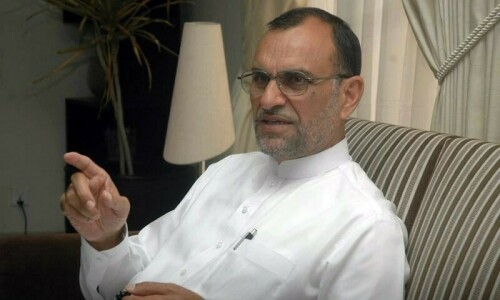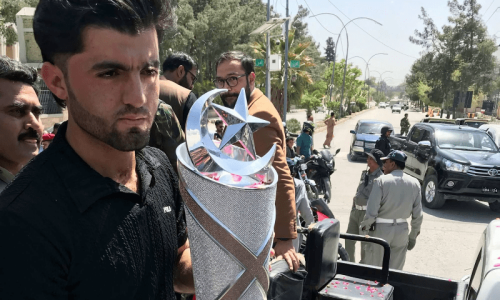• Puisne judge says executive institutions cannot even question or disregard verdict without ‘disrupting the delicate balance’ of Constitution
• Deplores plight of minorities, calls for avenues to redress injustice
ISLAMABAD: Justice Syed Mansoor Ali Shah on Saturday reiterated that non-implementation of the Supreme Court judgements would mean breaching the concept of separation of powers enshrined in the Constitution which entrusts different jobs to the executive, legislature, and judiciary.
He was speaking at a conference titled “Overcoming the Implementation Challenges to Court’s Verdicts,” at a local hotel to commemorate the 10th anniversary of the 2014 Supreme Court judgement on Minority rights.
This structure or concept is the core component of democracy and therefore should not be disturbed at any cost, Justice Shah said. “This is the system of this country and that is the Constitution of this country, or make a new system,” he said, reminding that disregarding constitutional duty had serious consequences to follow.
Justice Shah, who is expected to do chamber work till Aug 23, referred to the landmark judgement on minority rights and observed that it was not possible to not implement the judgement and assured that he would take up the matter to ensure that the verdict was implemented in letter and spirit.
He said the structure of the Constitution envisaged that judgements of the Supreme Court had to be followed, and recalled how during a recent decision, the top court had held that the
non-implementation of the judgements amounted to the violation of the Constitution.
On Friday also, Justice Shah had stressed the importance of the implementation of the apex court’s verdicts.
If a judgement has not to be implemented then change the entire structure but as long the Constitution stays, it has to be honoured since the structure commands that the executive institutions have no choice but to comply with the orders of the Supreme Court, he added.
They cannot even question or disregard the implementation or risk challenging the entire framework of the legal system, thus disrupting the delicate balance of the Constitution, he stressed.
He said implementing the court decision was not out of courtesy but a constitutional obligation on the part of the executive. This delicate equilibrium or balance between the separation of powers should be honoured at all costs to check the executive’s overreach, Justice Shah said.
“No one has the choice or prerogative to second guess whether the judgement was right or wrong,” Justice Shah said.
While talking informally to media, Justice Shah said that detailed judgement on the reserved seats was being finalised. Since some of the judges are on vacation, it is likely that the detailed verdict may be announced after the summer vacation is over, he reportedly said.
Rights of minorities
Indicating how the legal sector or judiciary was looking at the rights of the minorities, Justice Shah, in his speech at the conference, emphasised the need to initiate efforts for inter-faith harmony and dialogue.
Religious tolerance is necessary to inculcate peace and harmony, otherwise conflict and violence coupled with violation of human rights will erupt, the judge said.
To be among progressive nations, Justice Shah said, it was necessary that the state ensured the protection of the minorities from violence and discrimination by ensuring that perpetrators of such violations must be brought to justice swiftly and decisively.
Likewise, the state must promote religious harmony and tolerance through education and public awareness campaigns by fostering an environment of mutual respect and understanding by dismantling the barrier of prejudice that often fuels discrimination.
Similarly, the state also protects the cultural and religious heritage of the minority communities, said Justice Shah, adding this involves preserving the places of worship, supporting cultural events and recognising the contribution of minorities.
The state must also provide avenues for the redressal of injustice of minority communities by ensuring their voices are heard and their grievances addressed, the judge said.
He recalled that Muslims constituted 93 per cent of the population, whereas both Christians and Hindus were 1.6pc respectively and 1pc population consisted of Sikhs and Buddhists etc., but the Constitution did not discriminate rather each of them enjoyed the same fundamental rights enjoyed by the Muslims.
Justice Shah cited a recent report by Freedom House which painted a bleak picture of Pakistan suggesting that the minorities were not provided religious safeguards.
There is a need to ponder and find out reasons why the religious minorities in our country were disturbed, Justice Shah said and then cited Surah Al-Baqra which says that there will be no compulsion in religion.
Published in Dawn, August 11th, 2024













































